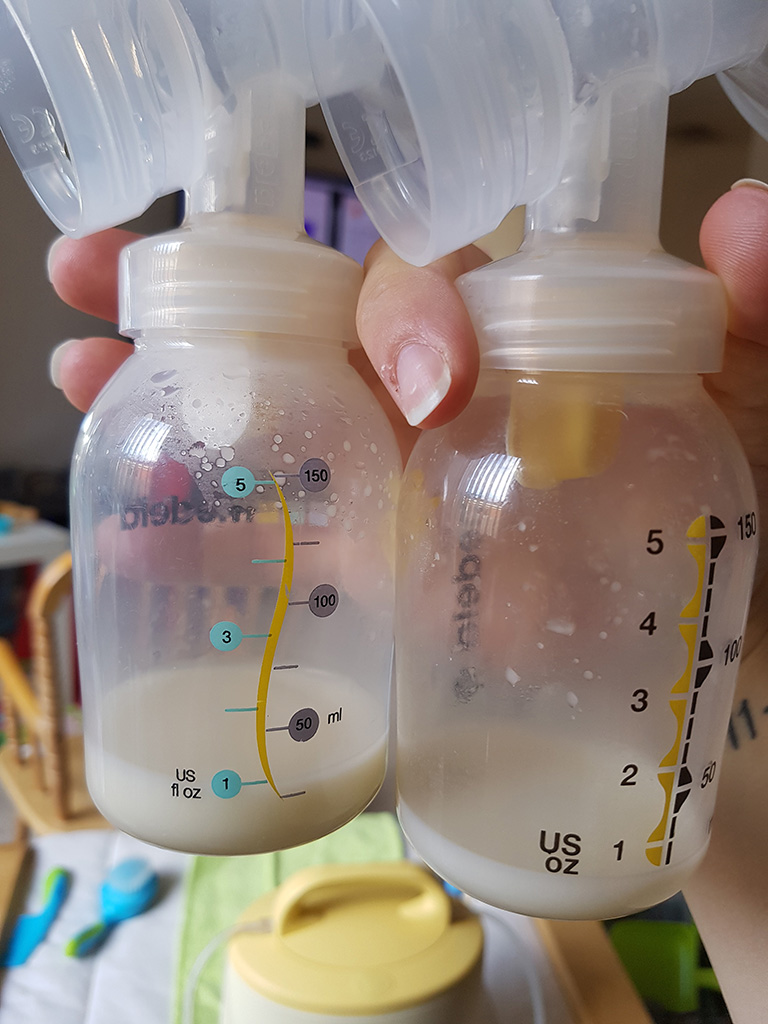By Yvette O’Dowd
You have probably heard of mothers losing their milk. You might even have been told it happened – or is happening – to you. You might be surprised then to learn the following facts:
You Know Your Milk Is Gone Because You Get Nothing With The Breast Pump
It is very common for people to try expressing and get only a few mls and panic when their milk is gone. This is not true! Learning to express your milk is a skill and takes practice. Most people are a bit anxious when they first try and might be doing it because they are already worried about their baby. Your body knows when you are anxious or worried – you produce hormones like cortisol and adrenaline when you feel this way.
These hormones get in the way of your calm, relaxing breastfeeding hormones like oxytocin and prolactin. Your brain thinks you are in Fight or Flight mode and gets ready for action – not ready to sit down to breastfeed your baby! To release milk in response to your baby, hand expressing or a breast pump, you need to feel calm, relaxed, safe and comfortable. If you learned mindfulness or relaxation techniques in pregnancy, now is the time to use them. And the other myth we will bust here: how much you can express does not indicate how much you make. It is a snapshot of how much is available and accessible right then.
Soon after a breastfeed, the volume you can pump is low – maybe 10 or 20 mls. Just before a breastfeed is due, you could pump nearly a full feed – perhaps 70 – 100ml! And in between feeds you will get somewhere in the middle. Around 20-50ml is common. You will only pump a whole feed if your baby hasn’t been to the breast for several hours. But always remember your baby can remove more milk than you can. Dribbles, drops and oozes are what many people get when they begin expressing – once the let-down reflex kicks in the milk might begin to run or spurt out. Breast compressions can increase the flow of milk while you express but always remember: the most effective tool to remove milk from the breast is a well-attached baby! Anything you can buy in the shop will never be as good.
Your milk supply cannot dry up overnight
Once established, milk production is pretty stable. It is not as vulnerable to changes in circumstances as our grandmothers and mothers were led to believe. Understanding of human lactation was pretty poor in the past and natural variations in how babies breastfeed and how breasts respond were frequently misunderstood. The fact is, when it comes time to wean, your breasts will continue to produce milk weeks, months and – rarely – years after the baby’s last breastfeed! Those few drops you can still squeeze out show your breasts haven’t ceased lactation and are ready to reboot production at any time. Indeed, you could relactate to return to breastfeeding or even induce lactation for a baby you haven’t given birth to!
Your Milk Has Dried Up Because You Did or Didn’t Eat or Drink Something
Around the world, humans breastfeed their babies successfully despite cultural and dietary differences. The reality is, as long as mothers are eating and drinking enough to sustain their own body, lactation will make sure it gets everything needed to make breastmilk to meet your child’s needs.
There is no one food crucial to milk production – whether you live in the Arctic Circle or live near the Equator, your normal diet is just what you need. Even if it doesn’t meet any dietary guidelines. There are NO foods, drinks or supplements which are necessary to make milk but there are lots of them which make money for the people promoting them. Eat when you are hungry, drink when you are thirsty and breastfeed your baby with confidence.
Your Baby Is More Hungry Because Your Milk Has Dried Up
Babies change their feeding patterns frequently. The time between feeds, length of feeds and how many breasts they take evolves as they grow and develop. Your three month old is not the same baby they were at six weeks and is nothing like the baby you will have at six months. Babies adapt their feeds to meet their needs – you don’t need to monitor or control anything. If your baby is showing hunger cues, that means they are hungry. It doesn’t mean you don’t have enough milk.
Your Softer Breasts Indicate Your Supply Has Gone
After the early days of establishing breastfeeding, it is normal for breasts to feel less firm and full. This shows you have transitioned into the next stage of milk production and this is how your breasts will look and feel until you reach the weaning stage. Hard, full (engorged) breasts are common in the first 6-12 weeks but after that you are only likely to experience breast fullness if you skip a breastfeed without pumping or your baby sleeps longer than usual. Soft breasts are actively making milk. Hard breasts have the brakes on.


So what can dry up your milk?
You might be surprised to find out some causes of sudden changes to milk production. Most people will not experience this.
Medications
Most prescription and over-the-counter drugs are safe when breastfeeding. Just a few can decrease your milk supply, so always remind your doctor and pharmacist that you are breastfeeding before starting new medicines.
Hormones
The female body is designed to breastfeed for most of the childbearing years, interrupted only by pregnancy. Even then, some women continue to breastfeed throughout their next pregnancy.
However, some babies do experience fussiness around the ovulation and menstruation stages of their mother’s cycle. If you do conceive a new pregnancy, natural changes to how you produce milk will occur during the first trimester and the volume of milk might decrease.
Some contraceptives like the Pill can have similar effects on your milk supply. There are alternatives which do not. Speak to your doctor about your breastfeeding goals before starting a new contraceptive.
Stimulants and Alcohol
Caffeine, nicotine and alcohol are all substances which can delay your let-down reflex. Mothers feeling fatigued caring for a baby might turn to caffeinated drinks and foods to give them a boost of energy, without knowing that caffeine has been shown to increase cortisol levels – that same stress hormone released during the Fight or Flight response. While moderate caffeine intake is fine for most breastfeeding parents – around 200mg a day – you might be taking more than just what comes in your morning coffee. Chocolate, cola and energy drinks also include caffeine – and even some energy bars or supplements include caffeine in their ingredient lists! Always check!
Nicotine and alcohol dependence might also slow the release of breastmilk. If you suspect this might be affecting you, seek guidance from your doctor to minimise the impact.
Mindfulness and relaxation techniques can be helpful to calm your mind and body and allow the milk to flow to your baby.
Mothers have been producing enough breastmilk to sustain their babies since the dawn of time. It is very rare to be physically unable to produce breastmilk at all. Once breastfeeding is established you are very unlikely not to be able to maintain your milk supply. And even if your supply does drop temporarily, it can nearly always be returned to normal production.
Yvette O’Dowd is not your typical grandmother! This mother of three and ‘Granny’ of three has been a breastfeeding counsellor since 1992. In 2014, Yvette established the Southern Natural Parenting Network, incorporating South Eastern Babywearing Group. With 11,000 members world-wide, the group supports parents interested in breastfeeding, babywearing, co-sleeping, baby-led weaning and modern cloth nappies and other aspects of gentle, natural parenting.
www.facebook.com/SouthernNaturalParentingNetwork


